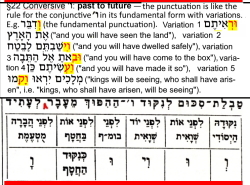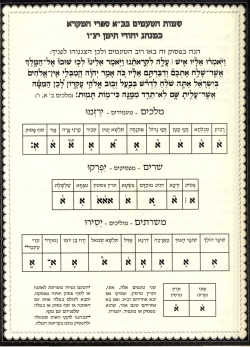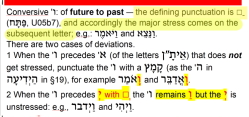
 |
Updated: 2020.10.11![]()
Hebrew linguists acknowledge that Biblical Hebrew was simpler than Modern Hebrew. Biblical-era perceptions and thinking were more primitive and simple than today. Then some of the same Hebrew linguists advance the most complex and oxymoronic theories to explain the "conversive vav". Yet, a simple and self-contained logical explanation is obvious. Ancient Biblical-era peoples thought primarily in simplistic—the imperfect—tense. Thus, when they wanted to convey an accomplished verb state, the "conversive vav" to transform past (which is ordinarily imperfect) to future perfect or future (which—contrary to routine "literary license" translations—is ordinarily imperfect) to past perfect.
English translators have been universally remiss in sloppy conveyance of Hebrew conventional past and future—both of which can, consistently, only be imperfect. The CTSD ו both swaps tenses and perfects the imperfective. Distinguishing the CTSD ו from a solely conjunctive ו, however, can be challenging. One wonders if a present perfect nuance had been lost by the 7th century C.E. when Hebrew written punctuation was first begun.
 |
□וְ — Conjunctive-Only default conjunctive prefix for all word-forms not listed below
Example: וְאָנֹכִ֣י (Yᵊhō•shūꞋa 24.15 [and I-myself])
□וַ (contraction of □וְ + הַ [and the-particular, and the one and only])
Example: וַֽיהוָה֙ עֲלֵיהֶ֣ם יֵֽרָאֶ֔ה וְיָצָ֥א כַבָּרָ֖ק חִצּ֑וֹ וַֽאדֹנָ֤י יְהֹוִה֙ בַּשּׁוֹפָ֣ר יִתְקָ֔ע (Zᵊkhar•yâhꞋ 9.14 [Then the-particular {i.e. one and only} יְהֹוִה֙ shall be enlightening them, and shall have shot-forth His/Its Arrow like a lightning-bolt; and the-particular {i.e. one and only} A•dōn•âiꞋ יְהֹוִה֙ shall be trumpeting on His/Its shō•phârꞋ…])
□וִ(י) prefixing □יְ and drop the □ְ (shᵊwa)
Example: וִירוּשָׁלִָֽם (Yō•eilꞋ 4.1 [and Yᵊru•shâ•laꞋyim])
□וֶ when prefixing □ֱ
Example: בְּחֶ֣סֶד וֶ֭אֱמֶת יְכֻפַּ֣ר עָוֺ֑ן (Mi•shᵊl•eiꞋ ShᵊlōmꞋōh 16.6 [By lovingkindness and truth shall â•wōnꞋ continually (have to) be wiped-up.])
 |
When Prefixing Past (Only) Tense-States To Future Perfect plus transference of the accent symbol from מִלְּעֵיל to מִלְּרַע.
Example: וַֽיהוָה֙ עֲלֵיהֶ֣ם יֵֽרָאֶ֔ה וְיָצָ֥א כַבָּרָ֖ק חִצּ֑וֹ וַֽאדֹנָ֤י יְהֹוִה֙ בַּשּׁוֹפָ֣ר יִתְקָ֔ע (Zᵊkhar•yâhꞋ 9.14 [Then the-particular {i.e. one and only} י‑‑ה shall be enlightening them, and shall have issued-forth![]() His/Its Arrow like a lightning-bolt; and the-particular {i.e. one and only} A•dōn•âiꞋ י‑‑ה shall be trumpeting on His/Its shō•phârꞋ…])
His/Its Arrow like a lightning-bolt; and the-particular {i.e. one and only} A•dōn•âiꞋ י‑‑ה shall be trumpeting on His/Its shō•phârꞋ…])
As normally accented (penultimate syllable; e.g., in Tᵊhil•imꞋ 45.8), conjunctive-only ו: וְאָהַ֣בְתָּ
As accented in the Shᵊm•aꞋ, Shᵊm•ōtꞋ 6.5: וְאָ֣הַבְתָּ֔ אֵ֖ת יְהוָ֣ה
Reciting the wrong accent results in "So you were loving י‑‑ה" rather than the correct "So [at the end of your life] you shall (i.e. must) have loved י‑‑ה".
□וּ
When prefixing any letter other than י cantillated with a □ְ or letters בומ״פ
Example: וּבֵיתִ֔י (Yᵊhō•shūꞋa 24.15 [and my household])
When Prefixing Past Tense (Only): Tense-States To Future Perfect
Example: וּבָ֗אוּ הָאֹֽבְדִים֙ (Yᵊsha•yâhꞋu 27.13 [So the lost {of…} shall have come![]() ])
])
 |
□וָ
when prefixing any disjunctive ![]()
Example: וָמֵ֑ת (Shᵊm•ōtꞋ 21.35 {so it was dying})
When Prefixing Future Tense (Only): Tense-States To Past Perfect
Example: וָֽאֶתְנַפַּל֩ לִפְנֵ֨י יְהוָ֜ה (Dᵊvâr•imꞋ 9.18 {Then I prostrated myself![]() before יְהוָ֜ה})
before יְהוָ֜ה})
 |
□וַ
 |
 |